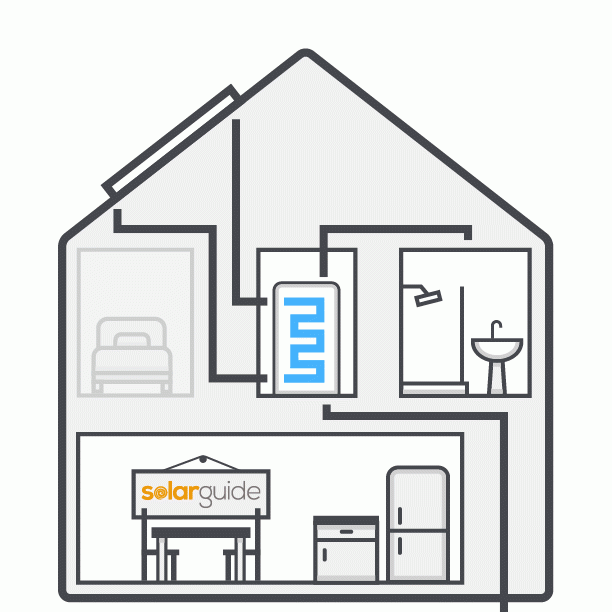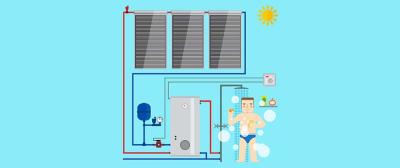Solar Water Heating Panels (UK): Pros, Cons, & Costs

A solar panel water heater (solar thermal panels) uses the natural heat from the sun to heat water for your home. Solar thermal technology is an increasingly popular renewable alternative to traditional water heating systems, but is it the right choice for your home?
We’ve taken a look at the pros, cons, and costs of installing a solar water heating system to help you decide.
If you’re sure that solar water heating is the best solution for your home, then the next step is to collect quotes from the top installers in your area. This process will take some time since you want to be careful about your choice and choose an installer who’s professional, qualified, and offers a fair price.
Luckily, at Solar Guide we have the solution that will make this a whole lot easier. We have a whole network of qualified installers based around the country that we can connect you with. We will only connect you with the most suitable installers in your local area, allowing you to find the best possible deal.
For up to 4 free quotes from the most reputable solar installers, all you have to do is provide us with a few small details, using the form linked below.
Get your best deal
Quickly compare up to 4 free quotes

What is solar water heating?
A solar hot water system is a renewable energy technology that harnesses the power of the sun to provide heat for domestic hot water purposes, much like traditional solar panels. The basic principle behind solar hot water heating is the conversion of sunlight into heat energy.
If you’d like to learn more about the differences between solar PV and solar thermal, check out our Solar PV vs Solar Thermal page.
The solar thermal system typically consists of solar collectors, a storage tank, and a circulation system that connects them. The solar collectors, also known as solar hot water panels, often mounted on the roof or in a sunny area, absorb the sun’s radiation and convert it into heat.
How does solar water heating work?
A solar hot water heating system uses solar thermal collectors. These panels look a lot like solar PV panels and work in a similar way, i.e. they capture energy from the sun, but rather than converting the heat into electricity, solar thermal collectors use the energy to produce hot water.
The resulting heated water or heat-transfer fluid is then directed from the collectors to a hot water tank, enabling a solar water heating system to provide your home with cost-free heated water.
The process is very simple:
- Solar thermal collectors are panels which are (usually) fitted onto your roof. The panels contain tiny tubes of water which are heated by the sun.
- This heated water can reach up to 90°C. It is passed down into your home where the heat is transferred to water in a storage tank or cylinder via a coil.
- Pipes then transport this hot water for use in your home.
Most properties will need a boiler or electric solar immersion heater to provide a backup supply of hot water during times of peak demand, but you should be able to significantly reduce how often you need to use them so you can lower your heating costs and carbon emissions.
Pros of solar hot water panels
- Reduce your annual energy bills: By providing up to 70% of a household’s hot water through free energy from the sun a solar water heating system can significantly reduce your overall energy use which reflects in your energy bills.
- Earn you money: Solar water heating systems could earn you money for every unit of renewable energy you generate under the government’s Renewable Heat Incentive (RHI) scheme.
- Reduce your carbon footprint: Using more renewable energy from the sun rather than buying fossil fuels like gas or oil from a supplier will reduce your carbon footprint.
- No running costs: Other than the initial installation cost and a little maintenance, there are no running costs to budget for with a solar water heating system as it uses free energy.
- Very low maintenance: Aside from an annual check by you, your system should only need professional servicing every 3-5 years.
Cons of solar hot water panels
- Not a complete solution: With a solar thermal system, you will still need a boiler or immersion heater to supply hot water through the winter and to supplement your supply on cloudy days.
- Cost of installation: An average solar water heating system tends to cost between £3,000 - £5,000 to install, which is a significant investment.
- Effectiveness depends on rooftop conditions: Ideally solar thermal collectors need to be installed on a roof facing due south at a 20-50 degree angle from horizontal. However, they can work effectively when positioned between south-east and south-west. They can also be installed on the ground in some circumstances but any shade will reduce their effectiveness.
- Does not supply electric power: Solar water heaters will not power electric showers or cold-fill dishwashers / washing machines.
- Not always compatible with combi boilers: Solar water heating systems are not always compatible with combi boilers as they heat water directly from the mains supply on demand; you will need to check with the manufacturer if your combi boiler will accept pre-heated water.
- Extra valve needed: If you have a regular heating system which is gravity fed you will need an extra valve or pump so the system can work effectively in winter when the heating is running at the same time.
- Solar compatible water cylinder needed: You will need to install a solar compatible water cylinder which is large enough to hold around 2 days of hot water.
To learn how solar water heating could work for your home, it’s a good idea to get a professional consultation from an experienced installer. With their advice, you can find the right panels that meet your exact needs.
For some free advice from local experts, why not use Solar Guide’s quote service? Not only can you learn more about the suitability of your home for solar thermal power, but you can also receive up to 4 free, tailored quotes from the most qualified professionals in your area.
Our service allows you to take advantage of the best local rates, from the best local professionals. We have a whole network of vetted installers we can connect you with. To get started, fill in our quick and simple form, linked below.
Get your best deal
Quickly compare up to 4 free quotes

Solar thermal panel design options
A major complaint of homeowners investing in solar thermal panels is that they disrupt the aesthetics of their home overall. However, nowadays some solar thermal and solar panel installers can offer more discreet installation options such as in-roof solar panel installation, where the panels replace the tiles on your roof. This means they won’t stand out as much because they are placed in-line with your roof tiles.
When it comes to colour options, you can usually choose between blue and black. However, if you’re looking to better match the colour of your rooftop, then you may be happy to know that there are various colours available for the frames and backing of the panels.
Solar thermal heating for swimming pools
Installing a solar thermal system specifically designed for swimming pools helps reduce both energy consumption and expenses associated with pool heating.
The main components of a solar pool heating kit include: solar collectors, a pump, a valve and a filter.
Solar thermal heating for a swimming pool works by pumping filtered pool water to the solar collectors to be heated, or cooled. It’s then pumped back into the pool which helps change the water temperature.
Here’s how solar thermal heating for a swimming pool works: The system pumps the pool water through the system filter. Next, the filtered water is directed to the solar collectors, where it is heated. The heated water is then pumped back into the pool. Gradually, the water temperature in the pool will heat up, providing you with a comfortably warm swimming environment.
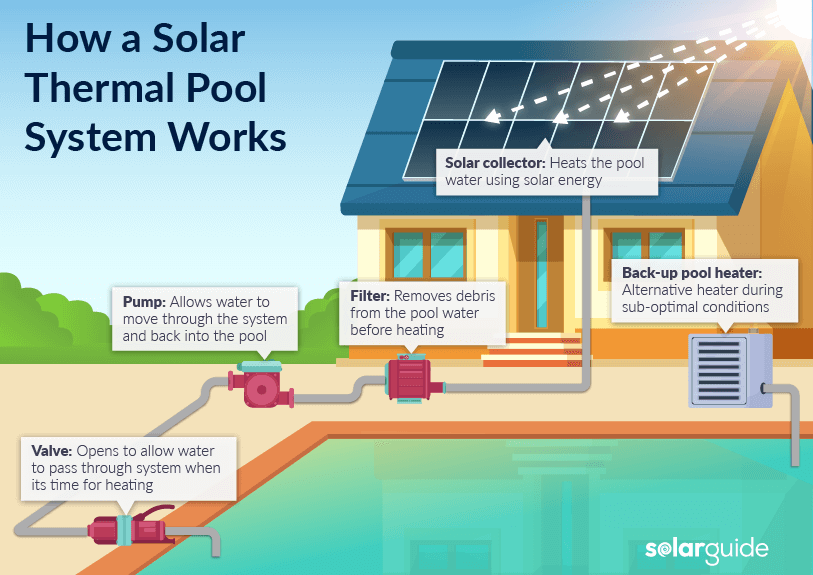
How much does solar thermal heating for swimming pools cost?
Solar water heating systems designed for swimming pools typically utilise unglazed flat-plate collectors. These collectors are unglazed, meaning they are uncovered, which means more heat loss will occur as they generate heat. This makes them only suited to smaller applications, i.e. swimming pools.
One significant drawback of using uncovered collectors is their reduced efficiency during winter months, necessitating the use of a backup heating system. However, the advantage of employing uncovered collectors lies in the overall cost reduction they offer, making solar thermal pool heating an increasingly popular and cost-effective alternative to traditional gas-fired pool heaters or renewable heat pump systems.
Take a look at the cost-estimates below to compare these systems.
| Costs of pool heating systems (excluding installation) | |
|---|---|
| Solar thermal (unglazed flat-plate collectors) | £350 – £450 |
| Gas/oil-fired heater | £2,500 – £4,500 |
| Heat pump (air and ground source) | £2,000 – £5,000 |
Installation of solar thermal pool heaters is relatively easier and more affordable compared to alternative options. They can be conveniently placed either on the ground or on rooftops, as long as they receive ample sunlight exposure.
Solar thermal systems also significantly reduce running costs since they generate renewable energy on-site. In contrast, heat pumps and traditional pool heaters rely on electric, gas, or oil supplies to operate, resulting in higher ongoing expenses.
Solar water heating costs & savings
The cost of installing a solar water heating system in the UK tends to fall between £3,900 - £4,400, and can increase to around £5,500. This is based on the average demands of a family of 4.
The total cost depends on the size of the system needed, in the same way as solar panel costs. Industry recommendations suggest that you will need around 1m2 of panel per person living in the home.
| Size of System | People in Household | Average Cost of Installation |
| 2m2 | 2 | £2,700 – £3,200 |
| 3m2 | 3 | £3,300 – £3,800 |
| 4m2 | 4 | £3,900 – £4,400 |
| 5m2 | 5 | £4,500 – £5,000 |
| 6m2 | 6 | £5,200 – £5,600 |
These costs will also be impacted by the complexity of the installation, i.e. how simply the solar technology will integrate into your existing plumbing and whether or not scaffolding is needed. The size and brand of your solar water cylinder will also have an impact on the cost of your system.
Remember, you need to weigh up the cost of installation against the potential savings that a solar water heating system could deliver. The Energy Saving Trust gives the below figures as an estimation but specifies that savings will vary from user to user.
| Existing Heating System | Potential Fuel Bill Savings per year | Potential CO2 Savings per year |
| Gas | £160 | 330kg |
| Oil | £145 | 470kg |
| Coal | £155 | 900kg |
| Electricity | £275 | 290kg |
| LPG | £190 | 365kg |
The following data refers to homes in England, Scotland and Wales, based on fuel prices under the Energy Price Guarantee (April – June 2023).
One of the best ways you can minimise the total cost you pay for the supply and installation of your new solar hot water system is by collecting quotes from multiple solar installers. By doing so, you can compare their offers and choose the most suitable installer with the best deal.
It could take several hours to do your research into multiple companies and reach out to them for a quote. Not doing your due diligence could put you in the hands of an unreliable installer. However, collecting quotes from the best installers doesn’t need to be difficult. Or, with Solar Guide, we can do all the hard work for you.
We can connect you with up to 4 solar installers based in your local area who will offer professional consultation and a tailored quote for their installation services. It’s simple, quick and reliable. And the best part- it’s completely free!
To get started, fill in our form linked below.
Get your best deal
Quickly compare up to 4 free quotes

Solar water heating efficiency
Generally, a solar water heating system can produce between 40-70% of the hot water needed for a family of 4 annually. In a similar way to solar panel efficiency, exactly how much hot water you will benefit from is difficult to estimate, however, as there are a number of factors to consider:
- How much sunlight is available? In the sunnier UK months between April – September your collectors will absorb more heat from the sun and therefore generate more hot water. On cloudy days the system will not produce as much hot water.
- How much hot water does your family use? Obviously, the busier your household, the higher demand you will be placing on the system and the more likely it is you will need to supplement your supply with a boiler or immersion heater.
- Are you prepared to adapt your routine to suit the system? For example, taking showers in the evening when the hot water supply is at its highest is a great way to make the most of the hot water available.
- The capacity of your hot water cylinder will impact how much hot water you can store. If the cylinder can only hold one day’s worth of hot water, more than one cloudy day will mean you need to supplement with an immersion heater or boiler.
- If your heating and hot water are not set up with separate controls, when the heating is on your hot water supply may be reduced.
- It’s important to ensure that both your cylinder and pipework are adequately insulated to prevent heat loss.
- Keep in mind that you may not need the system to heat water to the highest possible temperature at all times. You can reduce the need for backup water heating by lowering the temperature of the water.
Types of solar panel water heaters
There are 2 types of solar thermal collector: flat plate or evacuated tubes.
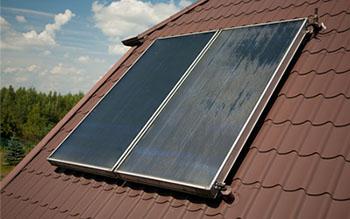
Flat Plate Collectors:
Flat plate collectors look more like traditional solar panels. They have a flat, glazed, dark-surfaced absorber plate which contains metal tubing. The plate covering the tubing, which is normally copper or aluminium, absorbs the solar energy, and the casing stops heat from escaping. A fluid is constantly run through the tubing which is heated up by the solar power captured from the sun.
Evacuated Tube Collectors:
Evacuated tube collectors have a very different look. The panel is a collection of glass tubes in a parallel row which have an absorber insulated by a partial vacuum. They are generally more expensive than flat plate collectors but provide an alternative aesthetic option and are argued to be the more efficient option.
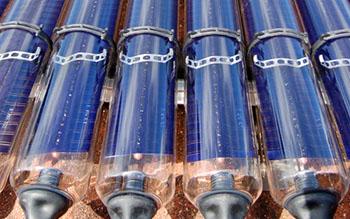
There are two different types of evacuated tube solar panels:
Direct Flow, where the fluid flowing in the absorber also flows through the pipes to the hot water cylinder.
Heat Pipes which have fluid in them that evaporates at a low temperature. When the fluid evaporates it rises up in the tube and condenses, transferring the heat it was carrying and the latent heat of condensation into the pipes into the hot water cylinder. The fluid then runs back down the tube again ready to be reheated.
Best solar hot water system manufacturers
We have listed some of the best solar panel water heater manufacturers on the market here, but you can find more information in our Best Solar Thermal Panels article.
| Manufacturer | Flat Plate Panel Collectors | Evacuated Tube Collectors |
| Viessmann | Vitosol 100FM or 200FM | Vitosol 200T, 300T, 200TM, 300TM |
| Worcester Bosch | Greenskies Solar Lito or Greenskies Solar Lifestyle | N/A |
| Kingspan | Kingspan Flat Plate Panels | Thermomax HP400/DF400 or Varisol |
Solar water heating installation & maintenance
In most cases, you don’t need to apply for planning permission for solar hot water panels as it’s categorised as a ‘permitted development’. Some homeowners in conservation areas or listed buildings may need to contact their local authority before proceeding.
Once the system is in place you should be covered by a warranty. Warranties tend to cover a 5 or 10 year period and require very low maintenance. Aside from noticing problems with the performance of the system, other potential issues could be a faulty pump or an antifreeze leak. However, if everything is running smoothly, you simply need a professional to check the system every 3-5 years.
Get free solar water heating quotes
If you think a solar water heating system could be the right choice for your home, your next step is to get multiple quotes for installation. This is the best way to compare prices and professional advice ensuring you get the right size and type of system. It can also provide the peace of mind that you won't have overpaid.
We can put you in touch with up to 4 of the UK’s leading solar installation professionals for free, no-obligation quotes. Use our simple online form and get solar thermal quotes from trusted traders in your area.
Get your best deal
Quickly compare up to 4 free quotes

Frequently asked questions
Is solar water heating any good?
A solar hot water heater will cost more upfront than traditional hot water heaters, however, once installed it will significantly reduce your monthly energy bills. A solar hot water system is most suitable in homes that space where enough sunlight can be captured, and that already have an existing boiler which is compatible with a solar hot water heater.
What is solar water heating?
Solar hot water heating primarily generates heat energy for domestic hot water applications by converting sunlight into heat energy. A typical solar hot water system uses solar hot water panels to absorb the sun’s radiation and transform it into usable heat, as well as a hot water storage tank, and an interconnecting circulation system.
What are the disadvantages of a solar water heater?
Some of the main disadvantages to a solar hot water system include:
- High upfront investment
- Doesn’t work optimally over winter>
- Significant home space required for panels and hot water storage tank
How efficient is solar water heating?
A solar hot water heating system can produce between 40-70% of the hot water needed for a family of 4 annually. Its efficiency depends on its position on your home, how much sunlight it’s able to capture, and the time of year.
Find local, MSC certified Solar Installers
Start your quote
Find local, MSC certified Solar Installers








